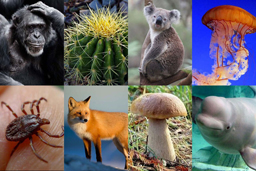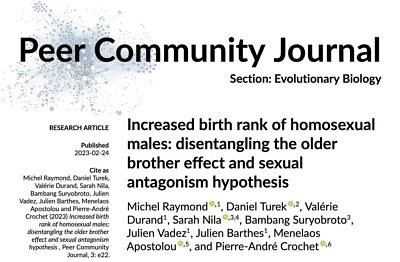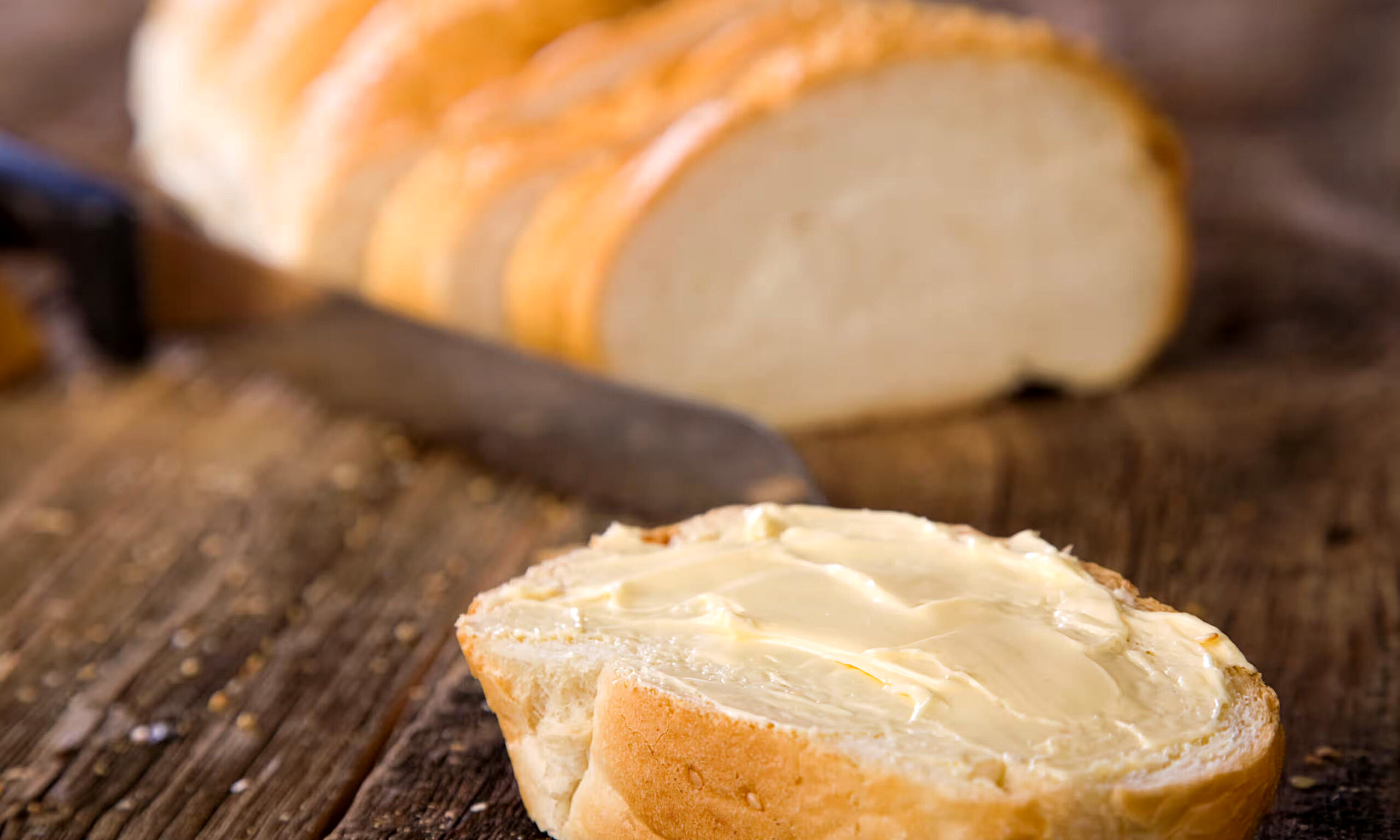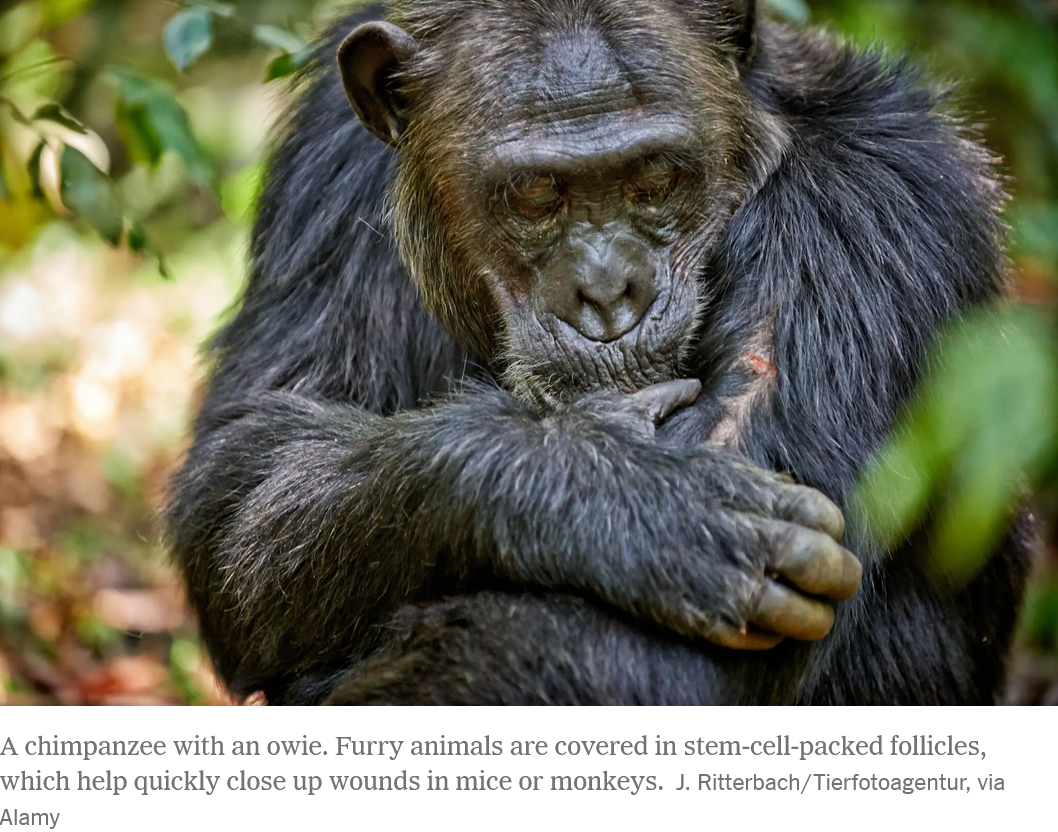Michel Raymond
Research Director
Human evolutionary biology, by overturning the traditional (but arbitrary) barriers between evolutionary biology and the human sciences, approaches everything related to the human species from a new angle.
I am particularly interested in cultural evolution, conflicts around parental investment, the evolution of aesthetic preferences, the understanding of manual laterality, and certain Darwinian paradoxes (frequent and heritable traits associated with lower survival or reproduction).
I propose an optional teaching module (introduction to human evolutionary biology) in the M2R Biodiversity, Ecology and Evolution course.
Raymond et al. 2023
Link to article Latest article on male homosexual preference: how to explain the effect of rank...
People who eat a breakfast rich in refined carbohydrates are considered less attractive...
According to a study... Press article published in "The Guardian" Press article published in...
Empathy for other species
Rich, diverse and complex, the range of emotions we feel when in contact with other organisms
organisms is...
organisms is...
Nutrition and disease in humans
Over the course of the 20th century, a substantial change in diet took place in...
Genetic adaptation to risk
The aim of this project is to study risk-taking behavior, the possibility of...
A broader cultural view is necessary to study the evolution of sexual orientation
The causality of sexual orientation is probably complex and influenced by multiple factors. We...
A broader cultural view is necessary to study the evolution of sexual orientation
The causality of sexual orientation is probably complex and influenced by multiple factors. We...
- 1
- 2
170 documents
- Mylène Weill, M. Marquine, A. Berthomieu, M. Dubois, C. Bernard, et al.. Identification and characterization of novel organophosphate detoxifying esterase alleles in the Guangzhou area of China.. Journal of the American Mosquito Control Association, 2001, 17 (4), pp.238-44. ⟨hal-01946124⟩
- Elodie Gazave, Christine Chevillon, Thomas Lenormand, Maïté Marquine, Michel Raymond. Dissecting the cost of insecticide resistance genes during the overwintering period of the mosquito Culex pipiens. Heredity, 2001, 87 (4), pp.441-448. ⟨10.1046/j.1365-2540.2001.00926.x⟩. ⟨hal-02188820⟩
- Claire Berticat, Maïté Marquine, Michel Raymond, Christine Chevillon. Recombination between two amplified esterase alleles in Culex pipiens. Journal of Heredity, 2001, 92 (4), pp.349-351. ⟨10.1093/jhered/92.4.349⟩. ⟨halsde-00186380⟩
- Michel Raymond, Claire Berticat, Mylène Weill, Nicole Pasteur, Christine Chevillon. Insecticide resistance in the mosquito Culex pipiens: what have we learned about adaptation?. Genetica, 2001, 112/113, pp.287-296. ⟨10.1007/978-94-010-0585-2_18⟩. ⟨halsde-00186377⟩
- Guillaume Bertault, François Rousset, Diana Fernandez, Arnaud Berthomieu, Michael Hochberg, et al.. Population genetics and dynamics of the black truffle in a man-made truffle field. Heredity, 2001, 86, pp.451-458. ⟨10.1046/j.1365-2540.2001.00855.x⟩. ⟨halsde-00186382⟩
- Lucile Lafuma, Marcel M. Lambrechts, Michel Raymond. Aromatic plants in bird nests as a protection against bloodsucking flying insects?. Behavioural Processes, 2001, 56 (2), pp.113-120. ⟨10.1016/S0376-6357(01)00191-7⟩. ⟨halsde-00186379⟩
- Mylène Weill, C. Berticat, Michel Raymond, Christine Chevillon. Quantitative Polymerase Chain Reaction to Estimate the Number of Amplified Esterase Genes in Insecticide-Resistant Mosquitoes. Analytical Biochemistry, 2000, 285 (2), pp.267-270. ⟨10.1006/abio.2000.4781⟩. ⟨hal-01946129⟩
- Claire Berticat, Marie-Pierre Dubois, Maïté Marquine, Christine Chevillon, Michel Raymond. A molecular test to identify resistance alleles at the amplified esterase locus in the mosquito Culex pipiens. Pest Management Science, 2000, 56 (9), pp.727-731. <a target="_blank" href="https://dx.doi.org/10.1002/1526-4998(200009)56:93.0.CO;2-I">⟨10.1002/1526-4998(200009)56:93.0.CO;2-I⟩. ⟨hal-02188813⟩
- Stéphanie Carrière, Michel Raymond. Handedness and aggressive behavior in an Ntumu village in southern Cameroon. Acta ethologica, 2000, 2, pp.111-114. ⟨10.1007/s102119900011⟩. ⟨halsde-00186389⟩
- Francis Schaffner, Michel Raymond, Nicole Pasteur. Genetic differentiation of Anopheles claviger s.s. in France and neighbouring countries. Medical and Veterinary Entomology, 2000, 14 (3), pp.264-271. ⟨10.1046/j.1365-2915.2000.00232.x⟩. ⟨halsde-00201912⟩
Follow Me On









